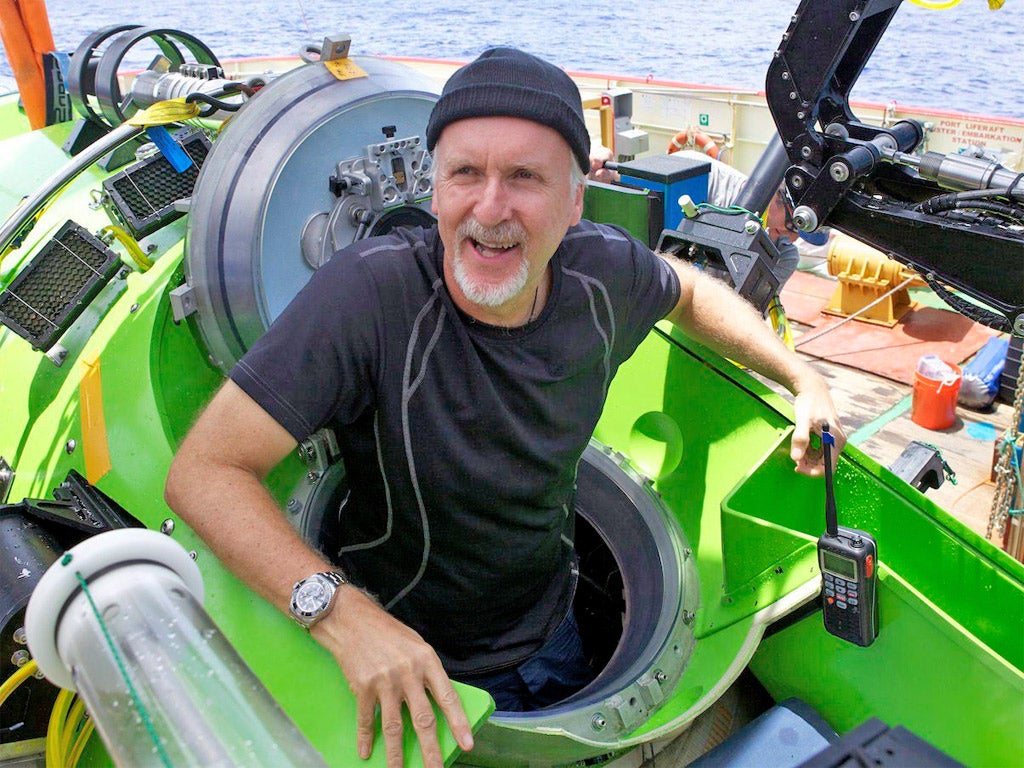From the depths to the heavens: star director sets out to mine asteroids
After his journey to the bottom of the sea, James Cameron has a new far-flung idea

Your support helps us to tell the story
From reproductive rights to climate change to Big Tech, The Independent is on the ground when the story is developing. Whether it's investigating the financials of Elon Musk's pro-Trump PAC or producing our latest documentary, 'The A Word', which shines a light on the American women fighting for reproductive rights, we know how important it is to parse out the facts from the messaging.
At such a critical moment in US history, we need reporters on the ground. Your donation allows us to keep sending journalists to speak to both sides of the story.
The Independent is trusted by Americans across the entire political spectrum. And unlike many other quality news outlets, we choose not to lock Americans out of our reporting and analysis with paywalls. We believe quality journalism should be available to everyone, paid for by those who can afford it.
Your support makes all the difference.The priceless mineral sought by boorish human colonisers in James Cameron's movie Avatar was sardonically called "unobtanium". Now, though, the director has decided space could provide humankind with natural resources that are anything but unobtainable, and he is on board with a pioneering new venture designed to mine asteroids for money.
The staggering scale of the ambition is matched only by the fortunes of the billionaires backing the venture and the size of the scientific brains being brought to bear. Yesterday, as a gang of space visionaries enthusiastically launched a company they are calling Planetary Resources Inc, you had to be a hardened cynic not to get caught up in wonderment at the prospects on offer.
Quite apart from the chance to tap vast new sources of vital commodities such as platinum and gold, and perhaps even minerals as yet undiscovered, there was even talk of mining for water and fuel and of "space-gas stations" that could fill up a battalion of rockets as it powers its way to vacation homes on Mars or beyond.
"Asteroids have existed for literally billions of years and have some of the most valuable materials we will need for the future of space and for future of earth," said Eric Anderson, a co-founder of Planetary Resources, at a packed launch event at Seattle's Museum of Flight with leaders of a scientific and business team that includes former astronauts and Nasa engineers.
The founders were silent on the finances of the venture, but insisted that its first unmanned craft would be in orbit within two years, mounted with telescopes prospecting for suitable asteroids. The mining equipment that would have to be bolted to future generations of craft has not been invented yet, let alone a mechanism for getting minerals back to earth.
Mr Cameron – who just last month journeyed to the furthest depths of the Pacific Ocean – has lent himself as an adviser to Planetary Resources, while some of America's best-known billionaires are lending their cash.
Larry Page, founder of Google, and Eric Schmidt, Google's chairman, are on board, as is Ross Perot Jnr, son of businessman Ross Perot, whose bid for the presidency of the US in the 1990s looked about as plausible as asteroid mining until he won almost one-fifth of the vote.
The co-chairman of the venture is Peter Diamandis, who set up the first space-tourism business (he brokers seats on Russian rocket journeys to the International Space Station) and runs the X Prize for space innovation, which has generated a private space race and the prospect of sub-orbital space tours starting by the end of this decade.
Mr Diamandis has long claimed the world's first trillionaires will make their fortunes in space and as long ago as 2005 he described the earth as "a crumb in a supermarket filled with resources"."
And what of this supermarket, this orbiting Tesco, where lifeless rocks spin through the solar system? Asteroids are the leftovers of a failed attempt to form a planet billions of years ago. Most of the remnants became the asteroid belt between Mars and Jupiter, but some pieces were pushed out to roam and some 1,500 of them are, according to Planetary Resources, "as easy to reach as the moon".
A single 500-metre platinum-rich asteroid contains the equivalent of all the platinum group metals mined in history, it says.
Join our commenting forum
Join thought-provoking conversations, follow other Independent readers and see their replies
Comments